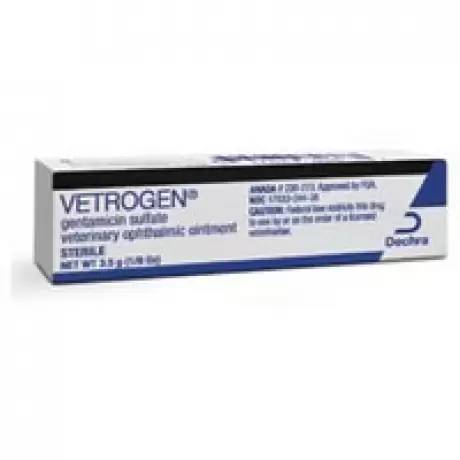
Vetrogen (gentamicin sulfate) Ophthalmic Ointment Rx
Vetrogen® (gentamicin sulfate) Veterinary Ophthalmic Ointment
Generic Gentamicin Sulfate Ophthalmic Ointment is available at VetRxDirect.
Why has my veterinarian prescribed Vetrogen® Ointment?
Gentamicin is an antibiotic prescribed to treat bacterial infections. This preparation is used to treat bacterial eye infections. Common infections treated with this medication are conjunctival infections and infections on the cornea (the clear part of eye).
How do I give Vetrogen® Ointment?
First, READ THE LABEL CAREFULLY.
Wash your hands before and after administering this medicine.
If you are giving your pet more than one eye medication, be sure to allow 5-10 minutes between medications.
Instill the drops or the ointment in your pet's eye(s) as directed by your veterinarian.
This medication may create a stinging sensation when it is applied.
Do not touch the eye with the tip of the dropper or tube.
DO NOT give your pet more medicine than directed.
DO NOT give your pet medicine more often than directed.
Try not to miss giving any doses.
If I miss a dose, what do I do?
If you miss a dose, give it to your pet as soon as possible. If it is almost time for the next dose, skip the missed dose, then continue with the regular dosing schedule. Do not give your pet two doses at once.
How do I store Vetrogen® Ointment?
Keep this medicine out of reach of children.
Keep this medicine in a container that is tightly sealed and light resistant.
What are the potential side effects of Vetrogen® Ointment?
This medication may cause stinging when it is applied to the eye.
Side effects are unusual with this medication.
If your pet’s eye looks worse after starting this medication, contact your veterinarian.
If you notice anything unusual, contact your veterinarian.
What about possible drug interactions?
Be sure to tell your veterinarian about any other medications you are giving your pet.
It’s not uncommon for your veterinarian to prescribe two different medications, which may cause a drug interaction to occur. If this happens, your veterinarian may change the dose and/or monitor your pet more closely.
Contact your veterinarian if your pet experiences any unusual reactions when different medications are given together.

